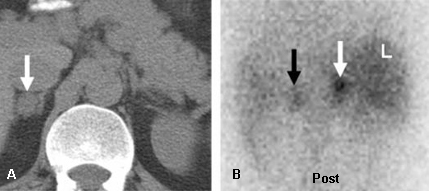Resumo
Diagnósticos diferenciais
comuns
- Adenomas adrenais não secretores
Incomuns
- Síndrome de Cushing
- Feocromocitoma
- Hiperaldosteronismo primário
- Cistos adrenais
- Mielolipomas adrenais
- Hemangiomas adrenais
- Ganglioneuroma adrenal
- Lesões adrenais granulomatosas infiltrantes
- Carcinoma adrenocortical
- Metástases adrenais
- Melanoma maligno de adrenal
Colaboradores
Autores
Benjamin Viglianti, MD, PhD
Associate Professor
Division of Nuclear Medicine
Department of Radiology
University of Michigan
Ann Arbor
MI
Declarações
BV declares that he has no competing interests.
Mitchel Muhleman, MD
Assistant Professor
Division of Nuclear Medicine
Department of Radiology
University of Michigan
Ann Arbor
MI
Declarações
MM declares that he has no competing interests.
Daniel Wale, DO
Associate Professor
Division of Nuclear Medicine
Department of Radiology
University of Michigan
Ann Arbor
MI
Declarações
DW declares that he has no competing interests.
Ka Kit Wong, MBBS
Associate Professor
Division of Nuclear Medicine
Department of Radiology
University of Michigan
Ann Arbor
MI
Declarações
KKW declares that he has no competing interests.
Agradecimentos
Dr Benjamin Viglianti, Dr Mitchel Muhleman, Dr Daniel Wale, and Dr Ka Kit Wong would like to gratefully acknowledge Dr Milton D. Gross and Dr Anca M. Avram, the previous contributors to this topic.
Declarações
MDG is an author of references cited in this topic. AMA declares that he has no competing interests.
Revisores
Shehzad Basaria, MD
Assistant Professor
Johns Hopkins University School of Medicine
Baltimore
MD
Declarações
SB declares that he has no competing interests.
Lawrence S. Kirschner, MD, PhD
Associate Professor of Medicine
Ohio State University
Columbus
OH
Declarações
LSK declares that he has no competing interests.
Créditos aos pareceristas
Os tópicos do BMJ Best Practice são constantemente atualizados, seguindo os desenvolvimentos das evidências e das diretrizes. Os pareceristas aqui listados revisaram o conteúdo pelo menos uma vez durante a história do tópico.
Declarações
As afiliações e declarações dos pareceristas referem--se ao momento da revisão.
Referências
Principais artigos
Grumbach MM, Biller BM, Braunstein GD, et al. Management of the clinically inapparent adrenal mass ("incidentaloma"). Ann Intern Med. 2003 Mar 4;138(5):424-9.Texto completo Resumo
Young WF Jr. Clinical practice. The incidentally discovered adrenal mass. N Engl J Med. 2007;356:601-10. Resumo
Fassnacht M, Tsagarakis S, Terzolo M, et al. European Society of Endocrinology clinical practice guidelines on the management of adrenal incidentalomas, in collaboration with the European Network for the Study of Adrenal Tumors. Eur J Endocrinol. 2023 Jul 20;189(1):G1-42.Texto completo Resumo
Zeiger MA, Thompson GB, Duh QY, et al. The American Association of Clinical Endocrinologists and American Association of Endocrine Surgeons medical guidelines for the management of adrenal incidentalomas. Endocr Pract. 2009 Jul-Aug;15(suppl 1):1-20.Texto completo Resumo
Expert Panel on Urological Imaging., Mody RN, Remer EM, et al. ACR Appropriateness Criteria® Adrenal Mass Evaluation: 2021 Update. J Am Coll Radiol. 2021 Nov;18(11s):S251-S267.Texto completo Resumo
Artigos de referência
Uma lista completa das fontes referenciadas neste tópico está disponível para os usuários com acesso total ao BMJ Best Practice.

Diretrizes
- Management of adrenal incidentalomas: European Society of Endocrinology clinical practice guideline in collaboration with the European Network for the Study of Adrenal Tumors
- ACR Appropriateness Criteria: adrenal mass evaluation
Mais DiretrizesConectar-se ou assinar para acessar todo o BMJ Best Practice
O uso deste conteúdo está sujeito ao nosso aviso legal